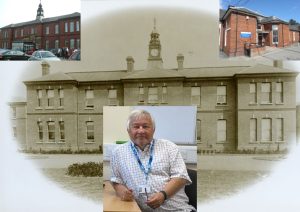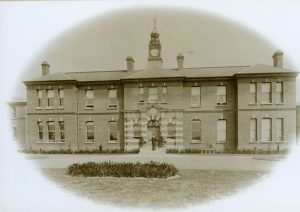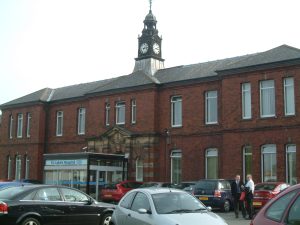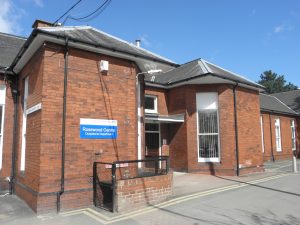
A dedicated NHS worker is taking on a fresh career challenge with our Trust – at the age of 72.
Stockton-born Rod Morris started as a cadet nurse at 16 and, over the past five decades, has helped and supported thousands of people with mental health problems across the North East.
Indeed, one of his projects helped create the Trust’s crisis team, and he has also pioneered nurse-led community assessment clinics and support groups for parents of children with ADHD.
Rod still, however, feels the need to “do his bit” – and has just taken on a new full-time role with a TEWV initiative supporting a single point of referral scheme for young people.
“Things have certainly changed over the years since I started in the NHS, especially the treatments offered. I have enjoyed being part of some very visionary and pioneering projects,” he said.

Rod, who was born just two years after the NHS was formed, started as a cadet nurse at St Luke’s – a mental health hospital in Middlesbrough – in 1966. Roseberry Park now stands on the site.
“I was reading the Gazette one night and saw a job advert. My mother Agnes told me to apply, so I did. You had to contribute to family finances after leaving school back then,” he said.
“My mother had actually worked as a nursing assistant at St Luke’s for a couple of years before this, and my father later joined the maintenance team after retiring from a paper factory.”
Newly recruited cadets were expected to acquire a thorough knowledge of the hospital, which was “its own community” with a butcher’s, cinema, garden gang, maintenance crew and other staff.
As a young cadet Rod worked in the pharmacy, medical records unit, operating theatre and even in the cobblers – learning the trade of nursing from the ground up.
“When I started it was very strict, very sombre, very formal,” said Rod. “Some of the senior staff had served in the military, and others were of military bearing. It was all very regimental.
“As a boy of 16 it was overwhelming. It could be a very disturbing environment, very unpredictable, as we just didn’t have the drugs and wide range of therapies we can rely on today.”

The strict regime, however, did not put Rod off his chosen career. After two years as a cadet, Rod then spent three years training as a mental health nurse at St Luke’s – finishing in 1971.
“Although it was hard work, we had fun too. I was part of the St Luke’s Amateur Matmen, a Saturday morning wrestling group, for a while – and also helped develop a social club for staff,” he said.
After qualifying, Rod worked as a deputy charge nurse, before spending a year at a training school as a clinical tutor. He later studied for general nursing exams at North Ormesby Hospital.
Once finished with his studies, he returned to St Luke’s as a charge nurse until, in 1976, he was offered the chance to work with young people with mental health problems in the adolescent unit.
“I was very sporty and quite fit at the time. I think that one of the reasons I was picked for the role was that I could keep up with the kids on the football pitch! I ended up there for 15 years,” he said.
Rod found that he relished the challenges of his new job and, in 1980, he completed a research year with Newcastle University – spending time at a referral unit for girls called Benton Grange.
“The girls had all had adverse childhood experiences and life had not been easy for them. Most were badly scarred by what they had gone through, sometimes both mentally and physically.
“But working with them was one of the highlights of my career. I will never forget those girls and trying to help them through very tough times.”
Once Rod had finished his research, he returned to St Luke’s and, in 1986, he combined his post of Charge Nurse with the job of Nursing Officer – looking after the day-to-day running of the site.
In 1990, however, he moved on to join the community psychiatric nurse service, becoming the first person to carry out nurse-led community assessment clinics in Hartlepool.
“This was a really pioneering scheme – a very big thing for the nurses involved,” said Rod.

Rod went on to help organise community-based groups for patients, including drama therapy, confidence boosters and self-concept sessions.
And he was also one of the first nurses in the region to set up support groups for parents of children suspected of having, or diagnosed with, ADHD in the early 1990s.
“At the same time, I also ran a youth group at weekends for young people with anxiety and low confidence, to help give them the support they needed,” said Rod.
“It was based at Parkside Mental Health Centre, near Albert Park in Middlesbrough, and was very visionary and ahead of its time.”

Rod’s work led to him being asked to join a research project on self-harm and suicide in young people, after which he recommended that a self-harm team be set up to help people across the Tees area.
This fledgling group would, in time, become the crisis team that is today run by TEWV.
“No extra money was put into the project – we all just worked together to make it work. I think that is one of the highlights of my career as well,” he said.
Rod went on to become team manager for the children and young people’s service at the Rosewood Centre in Middlesbrough for almost a decade – but is now looking forward to a new challenge.
At 72 he has been asked to take on a full-time role with the Getting More Help initiative – working with other organisations to support a single point of referral for young people.
“I know it will be a challenge, but it is a very worthwhile one,” said Rod. “We are trying to get kids in the right place, with the right people, at the right time – so we can secure healthier outcomes.”
Despite being one of the longest serving fulltime NHS staff members in the UK, Rod has no plans to retire – at least not quite yet.
“I have the date of February 2, 2026, in my mind at the moment, as that would mark 50 years of working with children and young people,” said Rod, a father of seven and grandfather of 11.
“I’ll put my feet up then I think, as I’ll have done my bit.”
